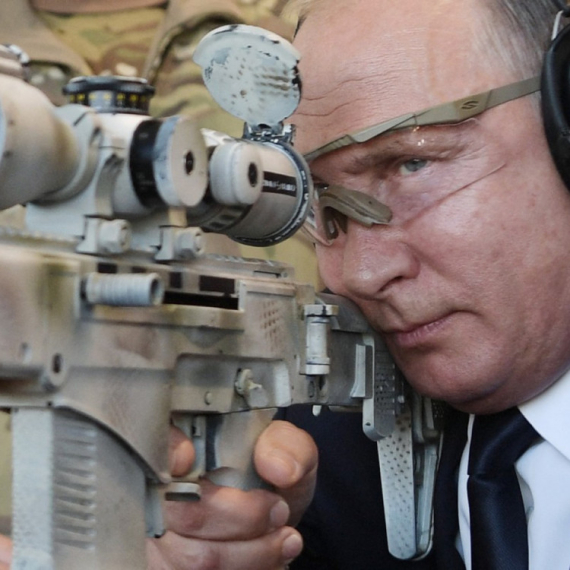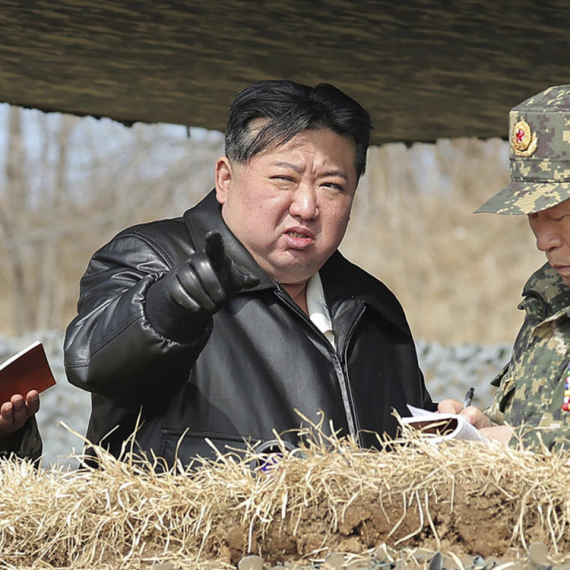UN Security Council didn't support Priština, FM says
Majority of UN Security Council members does not support unilateral actions announced by Priština, Serbian Foreign Minister Vuk Jeremić said in New York.
Friday, 16.09.2011.
09:12

Majority of UN Security Council members does not support unilateral actions announced by Pristina, Serbian Foreign Minister Vuk Jeremic said in New York. He told reporters after a UN Security Council session that EULEX and KFOR had not received Security Council’s support to transport Kosovo customs officers to administrative checkpoints in northern Kosovo. UN Security Council didn't support Pristina, FM says “That is an illegal and illegitimate action and neither the (UN) secretary general nor the UN Security Council support it,” Jeremic stressed. In his address to the UN Security Council late on Thursday, the minister warned that unless immediate and decisive action was taken, “in less than twenty-four hours, an incursion into the territory will be launched out of Pristina - with unforeseen consequences for the entire region.” “Should the operation announced by Pristina proceed, both security and political ramifications for the entire region will be substantial,” he said, adding that “the continuation of the dialogue between Serbia and Pristina would be seriously undermined, as would the implementation of what has been agreed so far." “For the past several months, the situation in Kosovo has been deteriorating,” the minister said, adding that “on numerous occasions throughout the summer, Pristina chose to act in a deliberately provocative manner, despite the real progress made in the Brussels-based dialogue.” He added that Belgrade had reacted positively and thus had helped prevent the situation from getting out of hand. “Despite the fact that the ethnic-Albanian authorities in Pristina did not suffer any consequences for having resorted to the unilateral use of force on July 25, Serbia decided to re-engage constructively in the dialogue, for the sake of regional peace and stability,” the Serbian foreign minister stressed. “We call on all the residents of the province to refrain from violence,” Jeremic stressed. He stated that after the September 2 agreement, Serbia had a “good-faith expectation that future rounds of dialogue would result in further agreements, and that the tensions would begin to calm down,” but pointed out that instead “increasingly bellicose announcements” by Pristina had turned the situation around. “Yesterday, diplomatic representatives of the so-called Quint Group of Countries - namely France, Germany, Italy, Great Britain and the U.S. - formally notified us in Belgrade of these plans (by Pristina to impose control over Gates 1 and 31), and of the roles the international missions in which they participate would play in carrying them out. Our response was firm and unwavering. For the Serbian government and people, any imposed outcome is totally unacceptable,” said Jeremic. He pointed out that the civilian population of northern Kosovo would refuse “to bow before the plans hatched by agents of an authority they consider to be completely illegitimate.” “If EULEX and KFOR participate in this operation, it will certainly result in their total loss of legitimacy as far as the Serbian side is concerned,” said the Serbian minister. “The mandates of both missions are rooted in resolution 1244 and the status-neutral framework of the United Nations,” he added. Jeremic recalled his UN address two weeks before, when he expressed Serbia's “concerns that a failure by this body to adopt a statement condemning the July 25 incursion by the ROSU special operations unit would be taken as direct encouragement for further unilateral action in Kosovo.” “Unfortunately, it is exactly what ended up happening,” the foreign minister added. “Serbia wants to make very clear that it shall accept no culpability for the consequences of what has been announced by the ethnic Albanian authorities for September 16,” he said. “The responsibility for whatever happens must rest squarely on the shoulders of those who are planning to carry out this ill-conceived operation,” Jeremic concluded. The UN Security Council Heated debate A heated discussion on Kosovo was held late Thursday at the United Nations Security Council, members of which remained divided over the situation in Kosovo and Pristina's announcement on deploying customs officers and policemen at Jarinje and Brnjak crossings. According to Tanjug, there was a heated debate during the closed segment of the session at which Jeremic held a speech. Russian Ambassador Vitaly Churkin and officials of France, Britain and the U.S. addressed the participants of the session several times. Ambassador Churkin pointed out that the operation plan for taking over Gates 1 and 31 made by the Kosovo government clearly said that it would lead to violence, and added that nevertheless the Kosovo authorities were elaborating on how they would react in case violence occurs. the U.S. and French officials stated that they thought the session was not necessary at all since they were convinced there was no danger of violence, but they were refuted by Acting Special Representative of the UN Secretary-General Edmond Mulet, who cautioned about the possibility of violence outbreaks and a report submitted by the Kosovo government. Churkin referred to Serbia's proposition about deploying EULEX's customs officers at the crossings without Kosovo Albanians and discussing everything else during a dialogue in Brussels. British, French and U.S. officials exchanged sharp words with Churkin during the session. According to diplomats, this was one of the most heated debates in the UN Security Council.
UN Security Council didn't support Priština, FM says
“That is an illegal and illegitimate action and neither the (UN) secretary general nor the UN Security Council support it,” Jeremić stressed.In his address to the UN Security Council late on Thursday, the minister warned that unless immediate and decisive action was taken, “in less than twenty-four hours, an incursion into the territory will be launched out of Priština - with unforeseen consequences for the entire region.”
“Should the operation announced by Priština proceed, both security and political ramifications for the entire region will be substantial,” he said, adding that “the continuation of the dialogue between Serbia and Priština would be seriously undermined, as would the implementation of what has been agreed so far."
“For the past several months, the situation in Kosovo has been deteriorating,” the minister said, adding that “on numerous occasions throughout the summer, Priština chose to act in a deliberately provocative manner, despite the real progress made in the Brussels-based dialogue.”
He added that Belgrade had reacted positively and thus had helped prevent the situation from getting out of hand.
“Despite the fact that the ethnic-Albanian authorities in Priština did not suffer any consequences for having resorted to the unilateral use of force on July 25, Serbia decided to re-engage constructively in the dialogue, for the sake of regional peace and stability,” the Serbian foreign minister stressed.
“We call on all the residents of the province to refrain from violence,” Jeremić stressed.
He stated that after the September 2 agreement, Serbia had a “good-faith expectation that future rounds of dialogue would result in further agreements, and that the tensions would begin to calm down,” but pointed out that instead “increasingly bellicose announcements” by Priština had turned the situation around.
“Yesterday, diplomatic representatives of the so-called Quint Group of Countries - namely France, Germany, Italy, Great Britain and the U.S. - formally notified us in Belgrade of these plans (by Priština to impose control over Gates 1 and 31), and of the roles the international missions in which they participate would play in carrying them out. Our response was firm and unwavering. For the Serbian government and people, any imposed outcome is totally unacceptable,” said Jeremić.
He pointed out that the civilian population of northern Kosovo would refuse “to bow before the plans hatched by agents of an authority they consider to be completely illegitimate.”
“If EULEX and KFOR participate in this operation, it will certainly result in their total loss of legitimacy as far as the Serbian side is concerned,” said the Serbian minister.
“The mandates of both missions are rooted in resolution 1244 and the status-neutral framework of the United Nations,” he added.
Jeremić recalled his UN address two weeks before, when he expressed Serbia's “concerns that a failure by this body to adopt a statement condemning the July 25 incursion by the ROSU special operations unit would be taken as direct encouragement for further unilateral action in Kosovo.”
“Unfortunately, it is exactly what ended up happening,” the foreign minister added.
“Serbia wants to make very clear that it shall accept no culpability for the consequences of what has been announced by the ethnic Albanian authorities for September 16,” he said.
“The responsibility for whatever happens must rest squarely on the shoulders of those who are planning to carry out this ill-conceived operation,” Jeremić concluded.
Heated debate
A heated discussion on Kosovo was held late Thursday at the United Nations Security Council, members of which remained divided over the situation in Kosovo and Priština's announcement on deploying customs officers and policemen at Jarinje and Brnjak crossings.According to Tanjug, there was a heated debate during the closed segment of the session at which Jeremić held a speech.
Russian Ambassador Vitaly Churkin and officials of France, Britain and the U.S. addressed the participants of the session several times.
Ambassador Churkin pointed out that the operation plan for taking over Gates 1 and 31 made by the Kosovo government clearly said that it would lead to violence, and added that nevertheless the Kosovo authorities were elaborating on how they would react in case violence occurs.
the U.S. and French officials stated that they thought the session was not necessary at all since they were convinced there was no danger of violence, but they were refuted by Acting Special Representative of the UN Secretary-General Edmond Mulet, who cautioned about the possibility of violence outbreaks and a report submitted by the Kosovo government.
Churkin referred to Serbia's proposition about deploying EULEX's customs officers at the crossings without Kosovo Albanians and discussing everything else during a dialogue in Brussels.
British, French and U.S. officials exchanged sharp words with Churkin during the session.
According to diplomats, this was one of the most heated debates in the UN Security Council.



























































Komentari 18
Pogledaj komentare